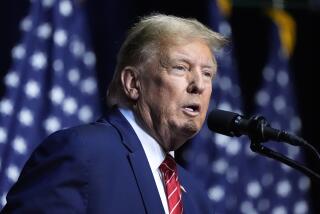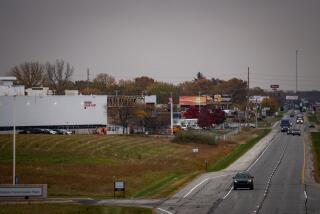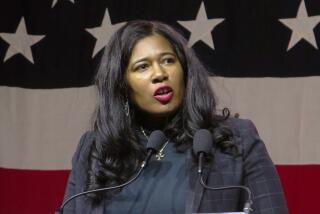In ‘vote of confidence’ for Trump, Ford cancels Mexico factory and will invest in Michigan

Ford’s chief executive said the move was a “vote of confidence” in the economic policies of President-elect Donald Trump. (Jan. 3, 2017)
For months, despite criticism from President-elect Donald Trump, Ford Motor Co. executives insisted that they would not alter their intention to spend $1.6 billion to build a new factory in Mexico.
But with Trump poised to be take office and showing no hesitation to use his new clout to publicly pressure companies over their practices, Ford abruptly reversed course.
On Tuesday, the automaker announced that it was scrapping plans to build a $1.6-billion plant in Mexico. Instead, Ford said it would invest $700 million to expand a Michigan plant to build hybrid, electric and autonomous vehicles that will add 700 jobs there in a move that Chief Executive Mark Fields described as a “vote of confidence” in Trump’s economic policies.
Ford’s decision, combined with a Trump tweet targeting rival General Motors Co., signaled his broader intentions to use jawboning, and perhaps trade penalties, to convince automakers to stop expanding production in Mexico and create more jobs in the U.S.
“President-elect Trump is having an impact on the auto industry right off the bat,” said Michelle Krebs, senior analyst at online vehicle marketplace Autotrader.
Ford’s decision might have been a preemptive move to try to tamp down prospects for a border tax, which would add a levy on vehicles imported into the U.S., she said.
“There’s a chess game going on and pieces are being moved,” Krebs said. “What we can’t see is the full picture yet.”
Ford’s announcement highlighted the importance of hybrid and electric vehicles to its future. The company said it would produce hybrid versions of its popular Mustang sports car and F-150 pickup truck by 2020.
Ford isn’t abandoning expanded production in Mexico.
The automaker said that to “improve company profitability” it would build its next-generation Ford Focus at an existing plant in Hermosillo, Mexico, starting in 2018. The production is being moved from Wayne, Mich.
But in the wake of criticism by Trump of companies moving manufacturing jobs south of the border, Ford said it would cancel plans announced in April for a major new factory in San Luis Potosi, Mexico, that would have produced the Focus compact cars.
“One of the factors that we see is a more positive U.S. manufacturing business environment under President Trump,” Fields said Tuesday in an interview on CNBC. “This is a vote of confidence in what we think the president-elect is going to pursue, and it’s right for our business.”
The 700 jobs to be added at Ford’s Flat Rock Assembly Plant in Michigan over the next four years are a small amount for an economy that created an average of 180,000 net new jobs a month last year. And Ford had insisted that the planned Mexico factory, which was to have led to 2,800 hires there by 2020, would not have siphoned jobs from the U.S.
Still, Trump was quick to trumpet Ford’s move.
He shared articles via Twitter about the company’s decision and posted a message on his Twitter and Instagram accounts saying, “Instead of driving jobs and wealth away, AMERICA will become the world’s great magnet for INNOVATION and JOB CREATION.”
A few hours before Ford’s announcement, Trump complained via Twitter that GM was selling Mexican-produced Chevrolet Cruze vehicles tax-free in the U.S.
“Make in U.S.A. or pay big border tax!” Trump tweeted.
GM responded that most Chevy Cruze vehicles sold in the U.S. are made here.
“All Chevrolet Cruze sedans sold in the U.S. are built in GM’s assembly plant in Lordstown, Ohio,” the company said. “GM builds the Chevrolet Cruze hatchback for global markets in Mexico, with a small number sold in the U.S.”
Of the 190,000 Cruze vehicles sold in the U.S. in 2016, just 4,500 were Mexican-built hatchbacks, GM said.
Automotive production has been growing in Mexico, which ranked seventh in the world in 2015 with 3.6 million vehicles produced, according to the U.S. Commerce Department’s International Trade Administration.
Since the start of 2010, U.S. and foreign automakers have announced more than $24 billion in investments in Mexico, according to the Center for Automotive Research think tank, which forecasts vehicle production there could double this decade.
Ford’s announcement was in the works well before Trump’s GM tweet, said Joe Hinrichs, president of Ford’s Americas group.
“Our commitment to the U.S. has always been there. It’s our home. It’s our largest market,” Hinrichs said in an interview. “This reinforced that commitment we have to the U.S. economy and U.S. manufacturing.”
The company outlined detailed plans for seven of the 13 new hybrid or electric vehicles it plans to introduce in the next five years. The moves are part of a $4.5-billion investment in electric vehicles by 2020.
The $700-million expansion of Ford’s Flat Rock Assembly Plant over the next four years will enable the factory to make a new “small utility vehicle with extended battery range” as well as “fully autonomous” vehicles for ride-hailing services, Ford said. It said the plant will also make the Ford Mustang and Lincoln Continental.
Shifting Focus production to Hermasillo, Mexico, from Wayne, Mich., will enable that U.S. plant to make “two new iconic products” there that will safeguard 3,500 jobs, Ford said. Hinrichs would not reveal what those models would be.
The Wayne factory has two shifts of workers producing the Focus, whose production will move to Mexico in 2018. One of the new vehicles to be built at the plant will begin production in 2018 and the other in 2020, so by then there will be at least two shifts operating there for existing workers, Hinrichs said.
Shortly after Trump was elected in November, he tweeted that Ford had decided to keep a Lincoln plant in Kentucky rather than move it to Mexico. Ford said it had decided to keep producing a small Lincoln utility vehicle at its Louisville Assembly Plant and had not intended to move all its production from its Kentucky facilities.
The changes announced Tuesday should not have a dramatic effect on Ford’s suppliers, Hinrichs said.
“We use largely the same supply base around the world,” he said. Some large products that are difficult to ship, such as seats, are produced near Ford factories, so the expansion in Michigan should lead to some additional work there for suppliers, Hinrichs said.
Follow @JimPuzzanghera on Twitter
ALSO
The era of super-low interest rates might be ending. What’s in it for you?
Trump’s victory could spell the end of the FCC’s net neutrality regulations
Trump hammered the Federal Reserve as a candidate. As president, he could quickly reshape it
UPDATES:
3:35 p.m.: This article has been updated with comments from Michelle Krebs of Autotrader and additional details and analysis.
12:05 p.m.: This article was updated with additional details from an interview with Joe Hinrichs, president of Ford’s Americas group, and comments from Chief Executive Mark Fields to CNBC.
This article was originally published at 9:40 a.m.







